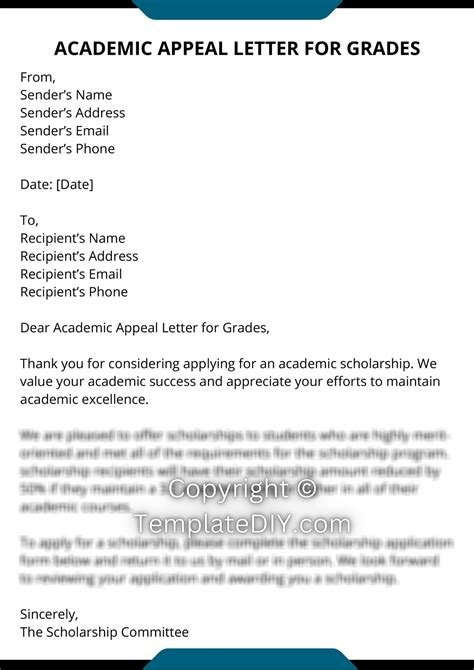Every student faces academic challenges at some point in their educational journey. A failed exam, a missed deadline, or a low GPA can cast a shadow over your academic record and jeopardize your future prospects. However, all is not lost. You can take proactive steps to address these setbacks and pursue an academic appeal.

What is an Academic Appeal?
An academic appeal is a formal request to review and reconsider an academic decision, such as a failed grade, suspension, or dismissal. You can file an appeal if you believe that the decision was unfair, inaccurate, or based on extenuating circumstances.
Grounds for Appeal
Universities and colleges typically outline specific grounds for appeal, which may include:
- Academic errors: Clerical errors, incorrect grading, or miscalculation of grades.
- Extenuating circumstances: Illnesses, family emergencies, or other events that significantly impacted your academic performance.
- Procedural irregularities: Violations of university policies or procedures that affected your academic standing.
- Discrimination: Unfair treatment based on race, gender, ethnicity, religion, or disability.
Writing an Effective Appeal Letter
The key to a successful academic appeal is a well-written and persuasive appeal letter. Here are some tips:
- Be clear and concise: State your specific request and grounds for appeal in the opening paragraph.
- Provide evidence: Include documentation to support your claims, such as medical records, emails, or witness statements.
- Be respectful: Address the decision-maker with respect and professionalism. Avoid confrontational or accusatory language.
- Be solutions-oriented: Explain how the decision has impacted you and propose a solution that addresses the underlying issues.
- Proofread carefully: Ensure that your letter is free of grammatical errors and typos.
Tips and Tricks for a Successful Appeal
- File your appeal promptly: Most universities have deadlines for submitting academic appeals. Adhere to these deadlines to avoid having your appeal dismissed.
- Consult with an advisor: Seek guidance from a trusted academic advisor, professor, or university official who can provide support and advice.
- Gather evidence: Collect any documentation or evidence that supports your claims. This may include emails, medical records, or witness statements.
- Be prepared for a hearing: In some cases, you may be required to attend a hearing to present your case. Prepare thoroughly and be ready to answer questions from the decision-maker.
Pros and Cons of Filing an Appeal
Pros:
- Opportunity to right a wrong: You can challenge an unfair or inaccurate academic decision.
- Potential for a favorable outcome: Your appeal may result in a revised grade, reinstated enrollment, or other positive outcome.
- Demonstration of resilience: Filing an appeal shows that you are determined to overcome challenges and improve your academic performance.
Cons:
- Time-consuming process: Appeals can take time to process and may delay your academic progress.
- Emotional toll: Filing an appeal can be stressful and emotionally draining.
- Possible denial: Your appeal may not be granted, which can be disheartening.
FAQs on Academic Appeals
1. What are the most common grounds for academic appeals?
Extenuating circumstances, academic errors, procedural irregularities, and discrimination are the most common grounds for academic appeals.
2. How long does it take to process an academic appeal?
The processing time for academic appeals varies depending on the university. Some appeals may be resolved within a few weeks, while others can take several months.
3. What happens if my appeal is denied?
If your appeal is denied, you can request a review of the decision or explore other options, such as filing a formal complaint or seeking legal advice.
4. Can I appeal a suspension or dismissal?
Yes, you can appeal a suspension or dismissal. However, these cases are typically more complex and may require additional evidence and support.
5. What is the success rate of academic appeals?
The success rate of academic appeals varies widely depending on the university, the grounds of the appeal, and the evidence provided. Some studies suggest that the success rate may range from 20% to 50%, while others indicate that it may be lower.
6. Should I hire a lawyer for my academic appeal?
In most cases, it is not necessary to hire a lawyer for an academic appeal. However, if your appeal involves complex legal issues or you are facing a serious academic sanction, you may consider consulting with an attorney.
7. What are some tips for writing a successful academic appeal letter?
Be clear and concise, provide evidence to support your claims, be respectful, be solutions-oriented, and proofread carefully.
8. What should I do if I am not satisfied with the outcome of my academic appeal?
If you are not satisfied with the outcome of your academic appeal, you can request a review of the decision, explore other options, or consider seeking external support, such as filing a formal complaint or contacting a legal professional.
